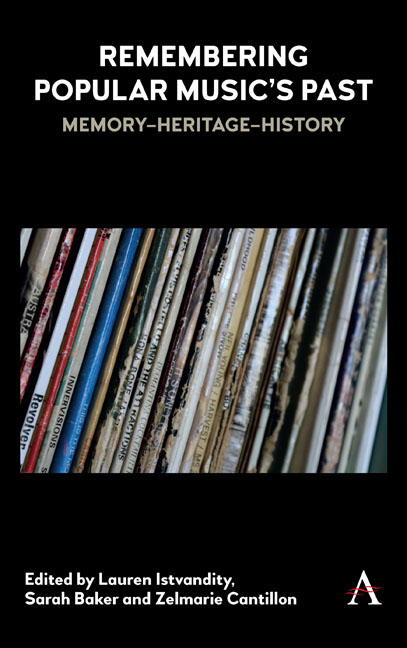Book contents
- Frontmatter
- Contents
- List of Figures
- Acknowledgements
- Chapter 1 The Precarity of Memory, Heritage and History in Remembering Popular Music's Past
- Part I MEMORY
- Part II HERITAGE
- Part III HISTORY
- Chapter 12 Jim Jarmusch's Mystery Train (1989): Representing the Memphis Music Legacy on Film
- Chapter 13 Phenomenology of the Surf Ballroom's Winter Dance Party: Affect and Community at a Popular Music Heritage Tourism Event
- Chapter 14 Disappearing History: Two Case Studies on the Precarity of Music Writing
- Chapter 15 Great Albums, Greedy Collectors and Gritty Sounds? A View from ‘Snobbish Connoisseurs’ on the Canonization and Archivalism of Korean Pop-Rock
- Chapter 16 Towards a Feminist History of Popular Music: Re-examining Writing on Musicians and Domestic Violence in the Wake of #MeToo
- List of Contributors
- Index
Chapter 12 - Jim Jarmusch's Mystery Train (1989): Representing the Memphis Music Legacy on Film
from Part III - HISTORY
Published online by Cambridge University Press: 09 July 2019
- Frontmatter
- Contents
- List of Figures
- Acknowledgements
- Chapter 1 The Precarity of Memory, Heritage and History in Remembering Popular Music's Past
- Part I MEMORY
- Part II HERITAGE
- Part III HISTORY
- Chapter 12 Jim Jarmusch's Mystery Train (1989): Representing the Memphis Music Legacy on Film
- Chapter 13 Phenomenology of the Surf Ballroom's Winter Dance Party: Affect and Community at a Popular Music Heritage Tourism Event
- Chapter 14 Disappearing History: Two Case Studies on the Precarity of Music Writing
- Chapter 15 Great Albums, Greedy Collectors and Gritty Sounds? A View from ‘Snobbish Connoisseurs’ on the Canonization and Archivalism of Korean Pop-Rock
- Chapter 16 Towards a Feminist History of Popular Music: Re-examining Writing on Musicians and Domestic Violence in the Wake of #MeToo
- List of Contributors
- Index
Summary
Mystery Train (1989) is American independent filmmaker Jim Jarmusch's third full-length movie. Critically acclaimed upon release, the film added another chapter to Jarmusch's cinematic journey through marginal urban America, beginning with Stranger Than Paradise (1984) and continuing with Down by Law (1986). Having articulated desolate views of New York, Cleveland and New Orleans in these earlier films, in Mystery Train Jarmusch directed his camera at Memphis, Tennessee, producing a melancholic comedy with oddball characters adrift in metropolitan loneliness. Memphis famously holds considerable significance in the American cultural imagination as the home of the King of Rock ‘n’ Roll, Elvis Presley. At the time the film was made, the city was suffering a kind of crisis of identity; it was living on fast fading glories of a popular music's past but not yet fully trading on its rich cultural heritage. In this chapter, we examine Mystery Train in relation to music heritage in Memphis. The city has been a major music centre in the United States since the mid-nineteenth century. Throughout the first half of the twentieth century, different music genres and styles were conceived and/ or developed in Memphis, from blues to soul, rock ‘n’ roll, gospel, country and pop. Music production in the city had its peak between the 1940s and the 1970s. In the late 1980s, Jarmusch captured the spirit of the city at a time when music did not seem to be as relevant for its identity and its economy as it had been previously.
In this chapter, we analyse the way in which Jarmusch's film remembers popular music's past within Memphis. We do so firstly by introducing the film in terms of its three-part structure, which enables an analysis of Memphis from the point of view of a range of non-American characters who provide Jarmusch with a certain critical distance. We then move on to consider more specifically the ways in which the episodes develop their analysis in interestingly different ways –Jarmusch ultimately making an argument that at the time of release, Memphis was too heavily reliant on a kind of gaudy Elvis mythologizing, and that the city's heritage ought be opened out to include key black artists and companies responsible for its development.
- Type
- Chapter
- Information
- Remembering Popular Music's PastMemory-Heritage-History, pp. 161 - 174Publisher: Anthem PressPrint publication year: 2019



